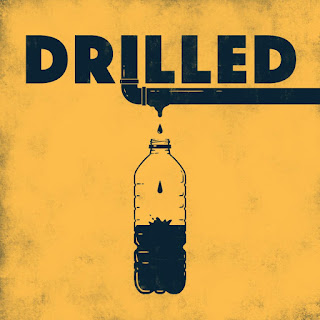A thousand-year flood in Europe. Forest fires in the western U.S. that are larger in area than four states. A heat dome that has killed hundreds. A major city in southern Florida under siege from sea level rise.
There can be no doubt that climate change is a hot topic.
That's why it's especially timely that on July 16, the most listened-to podcast on climate change Drilled
launched its sixth season “Bridge to Nowhere” exploring the rise of the
natural gas industry. The first episode just came out, with a new
episode every Friday.
Broken
into three parts, the season will use muckraking host Amy Westervelt’s
new research and reporting to explore the connection between fracking
and plastics in Part 1 (“Pipelines to Plastic,” July 16 - August 6), how
the natural gas industry fooled everyone into thinking it was a safe
alternative to fossil fuels in Part 2 (“Gas Bubble,” September 17 –
October 8), and the story of an Ohio community ravaged by the
petrochemical industry in Part 3 (“Frackalachia,” dates TBA).
“We’re
at this moment once again where the fossil fuel industry is pushing the
idea of natural gas as a ‘low carbon’ alternative fuel, a bridge to
renewables, an integral part of the clean energy transition,” Westervelt
explains. “So it’s really important that people understand the
immediate environmental concerns and long-term climate impacts of this
stuff. To highlight the issue from all sides, instead of telling one
long story this season, we’ve broken it into three parts, each looking
at a different side of the problem.”
Drilled is one of the few narrative
podcasts about climate change. In 2018 when journalist Amy Westervelt
was covering multiple climate lawsuits, she had the idea to put the
story of climate change, and climate denial, into a true-crime
framework. Season 1 (November 2018) focused on the climate research
conducted by oil companies and when and how they shifted from studying
the problem to denying it.
Season 2 (April 2019) followed a community of
crab fishermen as they became the first industry to sue Big Oil. Season
3 (January 2020) chronicled the 100-year history of fossil fuel P.R.
campaigns and ties them to the propaganda we still see today. Season 4
looked at how the fossil fuel industry used the Covid-19 pandemic to
roll back regulation, and Season 5 chronicled the decades-long legal
battle between indigenous groups in the Ecuadorian Amazon and Chevron.
Multiple future seasons are already in the works for the year to come.
What began as a limited-run 8-part series has become the most
listened-to podcast on climate change.
In 2020, Drilled
won the iHeartRadio Podcast Award for "Best Green Podcast” and in 2019,
it won the Online News Association award for “Excellence in Audio
Storytelling." In addition, Westervelt won an Edward R. Murrow award in
2016 and a Rachel Carson award for "women greening journalism" in 2015.
Amy Westervelt is the founder of the
Critical Frequency podcast network, and an award-winning print and audio
journalist. In 2016 she won an Edward R. Murrow award for her series on the impacts
of the Tesla Gigafactory in Nevada, and in 2019 she won the Online News
Association award for “Excellence in Audio Storytelling”. As the head of
Critical Frequency, she has executive produced more than a dozen
podcasts, including projects with Stitcher’s Witness Docs and Crooked
Media. Her book Forget Having It All: How America Messed Up Motherhood,
and How to Fix It was published in November 2018 by Seal Press.
Drilled Season 6 is only the beginning of an ambitious slate of projects from Westervelt this year. This fall, she will launch Rigged, a new web project and companion podcast focused on the history and functionality of disinformation, and Damages, a new legal-drama podcast focused on climate lawsuits.


Comments
Post a Comment
Thank You for your input and feedback. If you requested a response, we will do so as soon as possible.